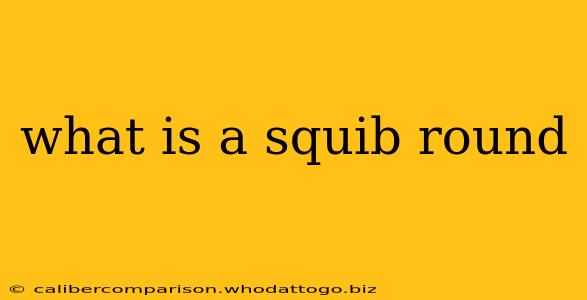A squib round is a potentially dangerous malfunction that occurs when a firearm cartridge is fired, but the propellant charge does not completely ignite or burn. Instead of a normal, powerful explosion, the squib round produces a weak, incomplete ignition, often accompanied by a "popping" or "click" sound instead of the typical bang. This leaves a bullet lodged in the barrel, creating a significant hazard for the shooter and anyone nearby.
Understanding the Mechanics of a Squib Load
Several factors can contribute to a squib load, including:
- Faulty Primers: A defective primer might not ignite the propellant effectively, leading to incomplete combustion.
- Damp or Corroded Powder: Moisture or corrosion can hinder the powder's ability to burn properly. This is more common in older or improperly stored ammunition.
- Obstructions in the Cartridge Case: Any foreign material blocking the propellant can impede the combustion process.
- Insufficient Propellant: While less common, undercharged cartridges can also result in a squib load.
The key characteristic of a squib round is the bullet's failure to exit the barrel. This lodged projectile creates a dangerous obstruction, potentially causing serious damage to the firearm if a subsequent round is fired.
Identifying a Squib Round
Recognizing a squib round is crucial for firearm safety. Look for these telltale signs:
- A weak or unusual sound: Instead of the normal loud report, you'll hear a quieter "pop" or "click."
- Lack of recoil: The gun will exhibit significantly less or no recoil than normal.
- No ejection of a spent casing: The cartridge case might remain in the chamber.
The Dangers of a Squib Load
Firing another round into a barrel obstructed by a squib round can have catastrophic consequences:
- Barrel Damage: The pressure from the subsequent round can cause severe damage to the barrel, potentially rupturing it and causing serious injury or death.
- Gun Damage: The firearm itself might be rendered unusable or irreparable.
- Injury to the Shooter: Debris from the damaged barrel can cause significant injuries to the shooter.
What to Do if You Suspect a Squib Round
If you suspect a squib round, never attempt to fire another round. Instead, follow these crucial steps:
- Keep the firearm pointed in a safe direction. Never point it at yourself or anyone else.
- Remove the magazine. Ensure no further rounds can feed into the chamber.
- Carefully open the action. This process varies depending on the type of firearm. Consult your firearm's manual for specific instructions.
- Visually inspect the barrel. Look carefully for the presence of a lodged projectile.
- If a squib round is found, use a cleaning rod specifically designed for firearm cleaning to remove it. Do not attempt to force the bullet out with excessive pressure, as this could damage the firearm. If you are unsure how to remove it safely, seek assistance from a qualified gunsmith.
- Thoroughly inspect the firearm for damage. Before resuming shooting, ensure the firearm is in good working order.
Disclaimer: This information is for educational purposes only and should not be considered professional gunsmithing advice. Always prioritize safety when handling firearms and consult a qualified professional for any repairs or maintenance.

